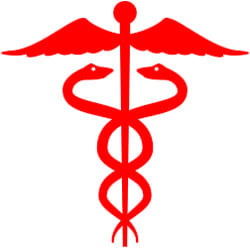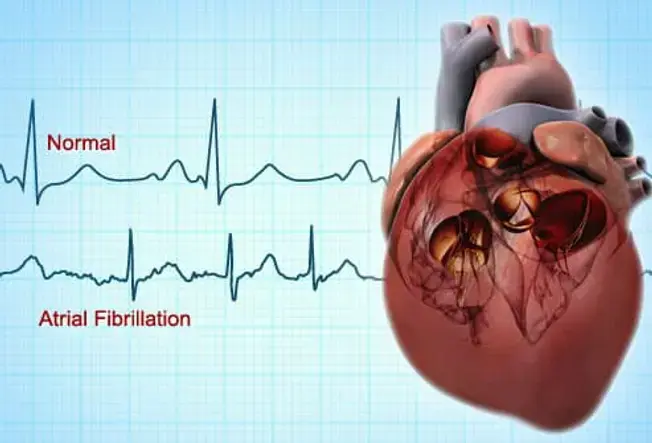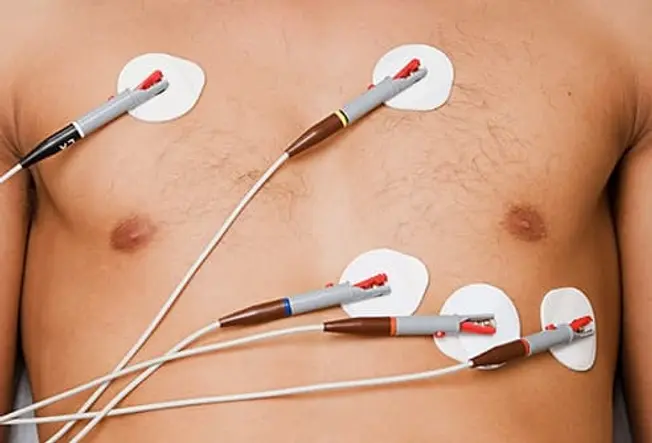Atrial Fibrillation
A report coming out a few days finds that the number of adults who have potentially dangerous irregular heartbeat called atrial fibrillation is triple the number that health experts previously thought.
Until now it was believed that atrial fibrillation affected 3.3 million adults. That estimate was based projection made from on a 1990s data.
Often called AFib, the condition has been known to be on the rise. But a new analysis published Wednesday in a major cardiology journal now estimates the numbers to be more 10.5 million adults. That's nearly 5% of the US adult population. The condition tends to affect people when they are older, particularly over age 60, so the new estimates makes AFib quite common among older adults.
Until now it was believed that atrial fibrillation affected 3.3 million adults. That estimate was based projection made from on a 1990s data.
Often called AFib, the condition has been known to be on the rise. But a new analysis published Wednesday in a major cardiology journal now estimates the numbers to be more 10.5 million adults. That's nearly 5% of the US adult population. The condition tends to affect people when they are older, particularly over age 60, so the new estimates makes AFib quite common among older adults.
People with AFib experience an irregular heart rhythm when the upper two of the heart's four chambers twitch and quiver. This can affect blood flow, which, in serious cases can lead to blood clots and stroke.
Symptoms may include shortness of breath, tiredness, dizziness, a rapid heart rate between 100 and 160 beats per minute, and palpitations, which is a heightened sense of the heart racing, fluttering, pounding, or skipping beats. Another symptom is exercise intolerance, meaning that people feel overly fatigued during exercise. But some people don't experience any symptoms.
Symptoms may include shortness of breath, tiredness, dizziness, a rapid heart rate between 100 and 160 beats per minute, and palpitations, which is a heightened sense of the heart racing, fluttering, pounding, or skipping beats. Another symptom is exercise intolerance, meaning that people feel overly fatigued during exercise. But some people don't experience any symptoms.
Atrial fibrillation doubles the risk of mortality-- is one of the most common causes of stroke, increases risks of heart failure, myocardial infarction ( heart attack), a chronic disease and dementia, and results in lower quality of life.
Fortunately, AFib is preventable, and early detection and appropriate treatment can substantially reduce its adverse outcome. The way to confirm AFib, is with an electrocardiogram (EKG). The machine detects and records electrical activity of your heart so than your can see problems with it's rhythm. You can do it in the doctor's office or you may need to wear a device that keeps track of your heart's activity for a longer time to catch an episode. The device can be worn for 24 hours to 2-weeks or sometimes longer.
Fortunately, AFib is preventable, and early detection and appropriate treatment can substantially reduce its adverse outcome. The way to confirm AFib, is with an electrocardiogram (EKG). The machine detects and records electrical activity of your heart so than your can see problems with it's rhythm. You can do it in the doctor's office or you may need to wear a device that keeps track of your heart's activity for a longer time to catch an episode. The device can be worn for 24 hours to 2-weeks or sometimes longer.
When you first develop AFib it may come and go. Your irregular heart rhythm may last anywhere for a few seconds to a few weeks. If a thyroid problem, pneumonia, or other treatable illness is behind it, Afib usually goes away once that cause is better.
But for some people, their heart rhythm does not return to normal.
The best treatment for you will depend on how long you've had AFib, how severe it is, and what's causing it. You may take medications that regulate your heart rate or rhythm, or blood thinners to help prevent clots. Or you may need a procedure called cardioversion, where a doctor attempts to reset your heart rhythm using electric shocks or drugs.
Credit: WebMD
But for some people, their heart rhythm does not return to normal.
The best treatment for you will depend on how long you've had AFib, how severe it is, and what's causing it. You may take medications that regulate your heart rate or rhythm, or blood thinners to help prevent clots. Or you may need a procedure called cardioversion, where a doctor attempts to reset your heart rhythm using electric shocks or drugs.
Credit: WebMD




